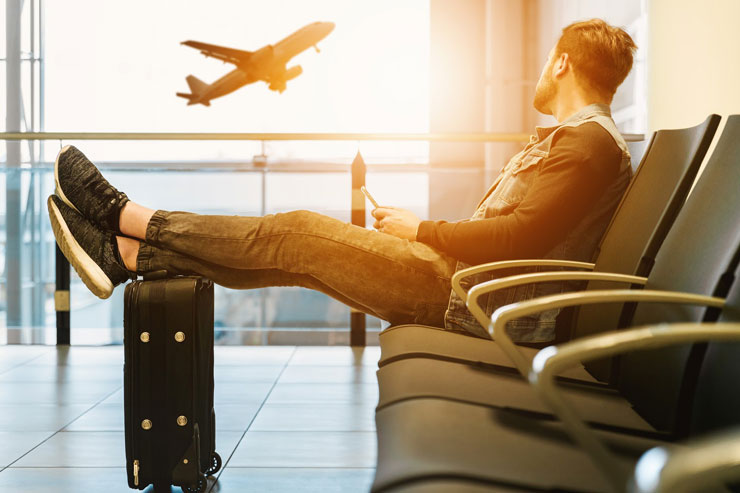
Travel Anxiety Tips to Help Manage the Fear of Flying Phobia
Roughly 20 million Americans suffer from a fear of flying, also known as aerophobia. Just the thought of getting on an airplane is too much for many people, so they may avoid flying entirely.
What causes a fear of flying, and are there any treatment options available? Can you ever wholly rid yourself of this life-restricting phobia?
Causes of Aerophobia
Although there is no specific cause of aerophobia, if a person has a fear of heights, they usually also have a fear of flying. More often, people fear flying because they have no control over their situation or their safety.

Sometimes this fear can be genetically inherited, or it may be modeled to children by their parents, but once you have a fear of flying phobia, it can restrict you and make you feel as if you can’t do the things you want to do, including travel.
Symptoms of Aerophobia
Every person’s reactions are different. Depending on the severity of the fear, the following are a few symptoms that may occur:
- Increased heart rate
- Shortness of breath
- Nausea
Treatment Options
One of the best forms of treating fear of flying is cognitive-behavioral therapy (CBT). The basis of CBT is that our thoughts create our feelings, which result in our behaviors. If we change our thoughts, we alter our behaviors.
CBT allows a person to manage their fears by helping to change the way that person thinks gradually. CBT helps a person develop a sense of mastery and confidence about their thoughts and feelings, so they feel less overwhelmed by them.
The CBT process also includes exposure-based strategies – This type of treatment gradually exposes the person to face their fear but in small steps. Exposure-based strategies for aerophobia might include reading about airplanes and how they function, or going to the airport and watching planes take off.
By exposing yourself to your fear of flying phobia, you gently get acquainted with the fear and emotionally embrace it rather than run from it.
Travel Anxiety Tips
Managing anxiety is critical when traveling, and fortunately, some powerful tips can help get you airborne calmly rather than in panic mode.
1. Learn Your Triggers – Knowing what triggers your anxiety when flying can help prevent the fear of flying from becoming activated. Some common aerophobia triggers are:
- When the plane takes off
- When there is turbulence
- When the plane lands
Being prepared is vital when it comes to fear of flying phobias. If you know that something is about to happen that will bring about anxiety, you can plan to cope with it in advance.
2. Get the Facts on Flying – Knowledge is power, especially when it comes to treating the fear of flying.
- Replace “What if..?” thoughts with facts, because anxiety thrives off of ignorance.
- Read up on how airplanes work and what causes turbulence.
- Don’t give in to anxiety-ridden thoughts; instead, do the opposite. Allow the feeling to pass as though you are going through an ocean wave.
One fact that might alleviate a fear of flying phobia is knowing that around 10,000 planes are airborne at any given moment, safely carrying passengers to their destinations.
3. Utilize Other Coping Skills – Distract negative thoughts by focusing on other things.
- Listen to music
- Read a good book
- Practice mindfulness meditation
Distracting the mind from any negative thoughts can be extremely beneficial. Instead of fighting the anxiety about flying, you can change the course of your thought pattern and focus on something else. When you fight the thought, it gives it more energy, almost like adding fuel to the fire. Refocus and restart your thoughts.
4. Seek Outside Assistance – Sometimes, the fear of flying phobia is too overwhelming, and seeking outside help is the only answer. A few of the most productive treatments include:
- Cognitive-behavioral therapy (CBT)
- Neuro-linguistic programming (NLP)
- Hypnotherapy
FAQs
Therapy is a personal process, and every client has distinct needs. Consequently, you might consider multiple types of therapy to address their unique needs. Cognitive behavioral therapy is a popular form of psychotherapy that teaches you to change and reframe your thinking patterns, but you can also achieve this result through hypnotherapy. You can start with individual therapy to learn about your options and create a treatment plan designed just for you.
Hypnotherapy helps you focus your thoughts. Once your fear of flying phobia dominates your thoughts, you could start experiencing symptoms. Hypnotherapy can help you implement changes to your behavior to help you overcome your aerophobia. You can also use hypnotherapy to manage symptoms of aerophobia, such as anxiety.
While CBT and hypnotherapy emphasize changing unhealthy thought patterns, NLP isn’t about learning to overcome one challenge. Your therapist will help you learn to identify successful behavior patterns and make rational choices that promote successful outcomes. NLP can help you boost your self-confidence and thrive personally and professionally.
Your fear of flying phobia stems from a traumatic event that may have caused post-traumatic stress disorder (PTSD). Your therapist may suggest Eye Movement Desensitization and Reprocessing (EMDR) because EMDR is a popular approach for clients with PTSD.
Whether you’re considering hypnotherapy, neuro-linguistic programming, or cognitive behavioral therapy for fear of flying, you should see a licensed therapist. Locate a behavioral disorder or mental health counselor licensed by the National Board for Certified Counselors. Choosing a licensed therapist ensures you’ll receive optimal mental health care from a qualified professional.
Every client has unique triggers. A handful of therapy sessions may help some manage their fear so they can fly. Others may need long-term therapy to address PTSD and other mental health challenges contributing to their aerophobia.
At Miami Hypnosis and Therapy, we utilize multiple treatments that work together to help each patient. We understand that phobias affect everyone differently, and so we create unique treatment plans for each patient.
Cognitive-behavioral therapy for fear of flying is beneficial, but when it is incorporated along with NLP and hypnosis, the treatment is not only expedited, it is far more effective.
Don’t let your phobia prevent you from enjoying life. Contact us today, and start living in peace instead of panic.






Write a Comment